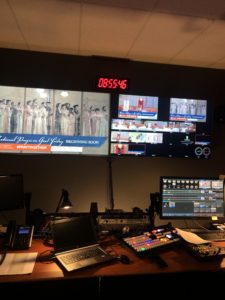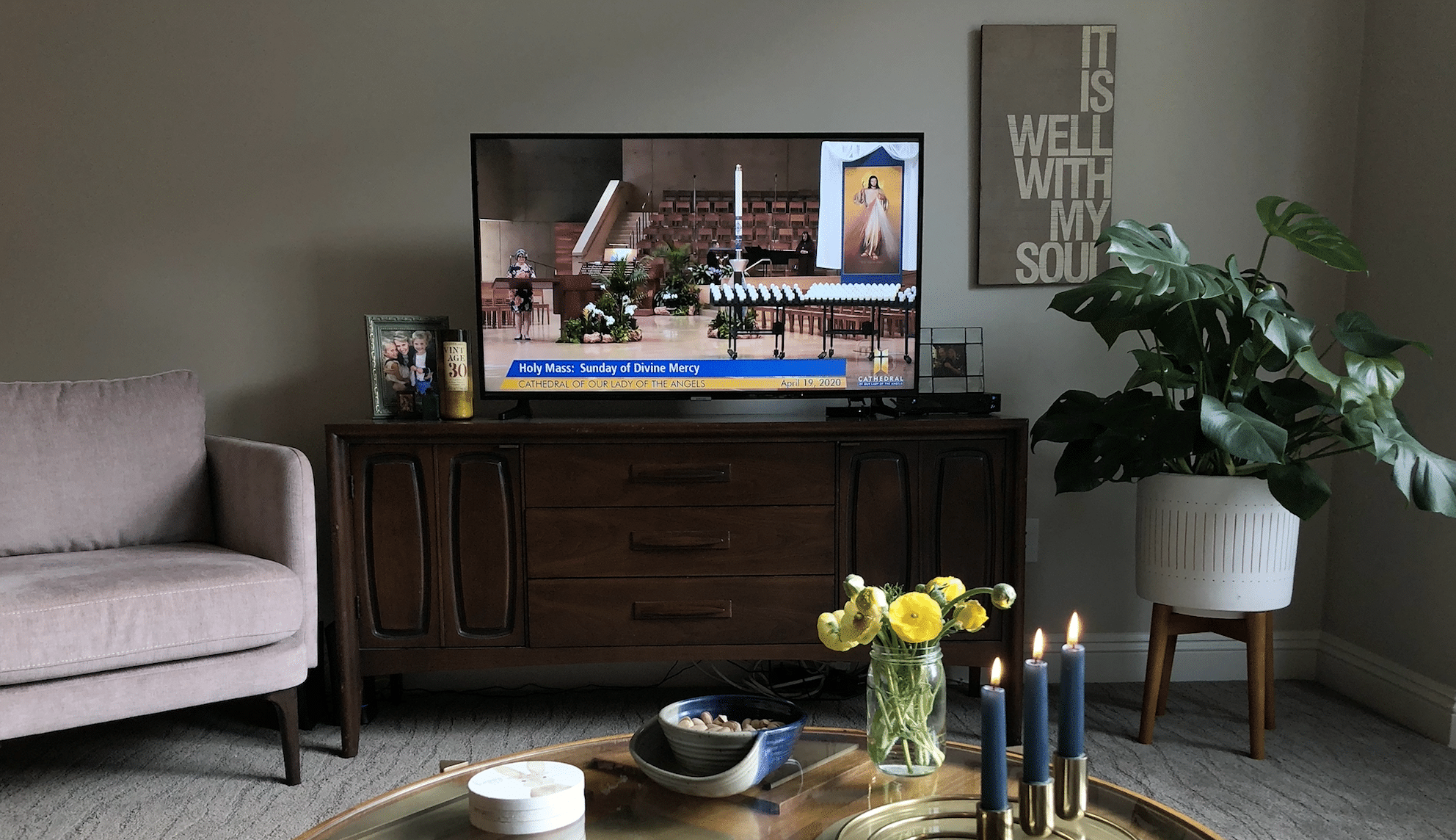Thank you to the 200+ parishes who have worked to keep their parish communities together, at least remotely. Your livestream efforts have blessed countless individuals and helped people make an act of spiritual communion during these difficult days.

GUIDANCE FOR PARISHES USING MUSIC IN LIVE-STREAM MASSES AND ONLINE ACTIVITIES
We are so blessed to have parishes keeping their communities together through live-stream Masses and online activities during the COVID-19 pandemic. You are change makers in this unprecedented time. Thank you for all you are doing. Your leadership, strength and grace is appreciated!
While we have all been trying to adapt quickly to this new way of life, some legal concerns have arisen and need to be addressed. A separate copyright license is required for online use of music that is different from the license you have for activities at your parish.
Using copyrighted music without a proper license deprives the artists of their royalty payments and can result in significant fines, removal of content and permanent removal of your account from online platforms (YouTube, Facebook, etc.). Most music is copyrighted, including commercially-recorded music, songs you perform and lyrics you distribute. While parishes generally have licenses for in-person use of copyrighted music on the church grounds (through the Archdiocese or otherwise), many have not purchased additional licenses required for online activities or live-stream Masses. Even those who have, may not have an online license that covers all of their online activities and live-streams. It is very important that you have the correct license to use music online. The process can be confusing but we are here to help.
Parishes have the following options for livestreaming or posting recordings online:
- Use no music, lyrics or singing;
- Use only music in the public domain (available without any cost, requires no license but may require acknowledgment or attribution); or
- Obtain a special license that covers the copyrighted music you want to use.
Free Music in the Public Domain. Music in the public domain may be livestreamed and posted for free without a license. This year, music and lyrics published in or before 1926 are generally in the public domain along with music that composers have specifically placed in the public domain. There are many beautiful and familiar public domain songs, but make sure you use a reputable source such as CCLI’s public domain list to confirm a song is in the public domain.
Obtain a License. You must have a license to use copyrighted music. The licenses typically run for one year. You may be familiar with Christian Copyright Solutions (CCS), Christian Copyright Licensing International (CCLI), and/or One License. If you already have a license with one of them or with another vendor, it most likely covers performances only, and not commercially recorded music, and it probably does not cover online use. Make sure any online license you obtain covers everything that you are doing online, including the music you are using and the way you are using it. Each online license is different.
FREQUENTLY ASKED QUESTIONS FOR PARISHES AND SCHOOLS
- Why is online use of music treated differently from what we normally do in church and school? Copyright law treats music used for / performed to a live audience differently than music that is used online. There are even differences if music is streamed online for a single use or posted online for later viewing. Some licenses allow you to use music only on your website, while others allow you to use music on social media and other third party platforms like YouTube and Facebook. Some online licenses allow you to livestream only, while others allow you to stream and record so you can post the performance online for later viewing. Some licenses allow you to post lyrics, others don’t. It is important you have the proper license and follow the notice and reporting requirements.
- What happens if I use copyrighted music without a license? Most social media platforms, like Facebook and YouTube, have programs that search for music and the site will either mute you during your livestream or shut the livestream down entirely. Owners of the copyrighted music may also file a lawsuit against you for copyright infringement, with statutory damages between $750 and $30,000 per use, plus attorneys’ fees or damages. For willful infringement, damages may increase to $150,000.
- Isn’t it fair use since we are using music for education purposes? The fair use exemption for teaching activities applies to face-to-face teaching in a classroom or similar place, as well as performances or displays that are not “transmitted” beyond the location. Accordingly, a webcast or similar transmission for teaching is not currently deemed fair use. It is unknown whether exceptions will later be applied as a result of the COVID-19 pandemic. Congress and the music industry were no better prepared for this pandemic than we were so we can only look to the laws that are already on the books for guidance.
- Isn’t it fair use since we are using music for religious purposes? The fair use exemption for religious activities applies to performances or displays in the course of services at a place of worship or other religious assembly. It does not extend to broadcasts or other transmissions to the public at large, even where the transmission was sent from the place of worship. Accordingly, a webcast or similar transmission for religious services is not currently deemed fair use. It is unknown whether exceptions will later be applied as a result of the COVID-19 pandemic.
- What about the TEACH Act? The Technology, Education, and Copyright Harmonization Act of 2001 (“TEACH Act”), § 110(2) allows transmitted performances or displays for distance learning only if the following conditions are met:
- the performance or display is made by, at the direction of, or under the actual supervision of an instructor as an integral part of a class session offered as a regular part of the systematic mediated instructional activities;
- the performance or display is directly related and of material assistance to the teaching content of the transmission;
- the transmission is made solely for and reception is limited to students officially enrolled in the course for which the transmission is made; and
- the transmitting institution provides materials and has in place policies that promote compliance with the copyright laws, provides notice that the materials used in the course may be protected by copyright, applies measures that prevent recipients from retaining the transmission past the end of the class session or further distributing the work, and does not attempt to interfere with the copyright owner’s protection of the work.It may be difficult for teachers to limit students from retaining the transmission past the end of class or to limit the session to students in that class. It also may be difficult for schools to have all of the materials and measures in place to promote compliance.
- Can we use music on Zoom? Zoom’s Acceptable Use Policy prohibits users from infringing on any intellectual property rights of others, including copyright. In addition, you cannot record on Zoom and then post the video on other platforms without a streaming license.
- Can we use YouTube’s Audio Library for free music in YouTube videos? Yes, but be sure to follow the attribution guidelines to credit the original artist in your video. Only post this music on YouTube, not other platforms.
- What about iTunes, Amazon Music, Spotify or other use of commercially recorded secular music? You cannot use music from your iTunes, Amazon Music, Spotify or similar account in your online activities without a license that permits you to transmit that music online. One License would not be enough. You need a vendor that sells licenses for the secular music you want to use.
- What about Virtual Graduation? You need to have a license unless you are performing only music in the public domain. The traditional graduation song, Pomp and Circumstance, is in the public domain and may be performed online. However, if you want to use a commercially recorded version of the song, then you need to make sure that version is in the public domain. If we were not under shelter at home orders, many of you might end the ceremony with graduates singing inspirational secular songs like “I Hope You Dance” or “Time of Your Life”. Those types of songs may be covered for performances in the building, but unfortunately One License does not cover secular songs for online use. You would need to purchase a license that covers the secular songs you want to use through another vendor.
- What about background music for photo arrays and award ceremonies? You can use public domain music or you can purchase a license from a vendor like Musicbed, which offers a license for commercially recorded secular and instrumental music.
